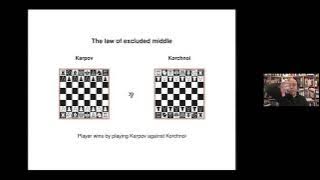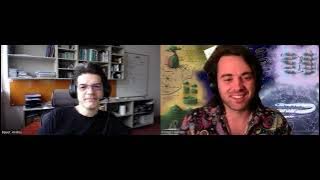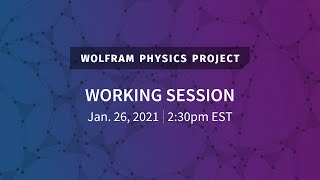
Ben discusses constructive and non-constructive proofs with examples.
From playlist Basics: Proofs

Introduction to Direct Proofs: If n is even, then n squared is even
This video introduces the mathematical proof method of direct proof provides an example of a direct proof. mathispower4u.com
From playlist Symbolic Logic and Proofs (Discrete Math)

The Composition of Surjective(Onto) Functions is Surjective Proof
Please Subscribe here, thank you!!! https://goo.gl/JQ8Nys The Composition of Surjective(Onto) Functions is Surjective Proof. I included some pictures in the proof with the hope that perhaps it makes more sense.
From playlist Proofs

Inequality Proof: Summing Reciprocals of Squares (Experimental Silent Screencast)
via YouTube Capture
From playlist The Nature of Proof

Hugo Herbelin: A constructive proof of dependent choice, compatible with classical logic
The lecture was held within the framework of the Hausdorff Trimester Program: Constructive Mathematics. Abstract: Martin-Löf's type theory has strong existential elimination (dependent sum type) what allows to prove the full axiom of choice. However the theory is intuitionistic. We give
From playlist Workshop: "Constructive Mathematics"

How to Prove a Function is Injective(one-to-one) Using the Definition
Please Subscribe here, thank you!!! https://goo.gl/JQ8Nys How to prove a function is injective. Injective functions are also called one-to-one functions. This is a short video focusing on the proof.
From playlist Proofs

Discrete Math - 1.8.2 Proofs of Existence And Uniqueness
Using varying methods of proof to prove existence or existence of a unique value. Textbook: Rosen, Discrete Mathematics and Its Applications, 7e Playlist: https://www.youtube.com/playlist?list=PLl-gb0E4MII28GykmtuBXNUNoej-vY5Rz
From playlist Discrete Math I (Entire Course)

We present updates to the automated geometric functionality of the Wolfram Language introduced in Version 12 and display new functionality for automated geometric reasoning.
From playlist Wolfram Technology Conference 2021

Paul André Melliès - Dialogue Games and Logical Proofs in String Diagrams
After a short introduction to the functorial approach to logical proofs and programs initiated by Lambek in the late 1960s, based on the notion of free cartesian closed category, we will describe a recent convergence with the notion of ribbon category introduced in 1990 by Reshetikhin and
From playlist Combinatorics and Arithmetic for Physics: 02-03 December 2020

Introduction to the Coq Proof Assistant - Andrew Appel
Introduction to the Coq Proof Assistant - Andrew Appel Princeton University December 7, 2010 A "proof assistant" is a software package comprising a validity checker for proofs in a particular logic, accompanied by semi-decision procedures called "tactics" that assist the mathematician in
From playlist Mathematics

Univalent Foundations Seminar - Steve Awodey
Steve Awodey Carnegie Mellon University; Member, School of Mathematics November 19, 2012 For more videos, visit http://video.ias.edu
From playlist Mathematics

My Thoughts on Constructing and Presenting Rigorous Proofs
In this video, I take a look at one of the ways induction proofs are being presented on YouTube. It turns out a lot of them are missing some pretty important details. I discuss what exactly it is they are doing, why I believe it is sloppy and imprecise, and give my general thoughts about r
From playlist Proofs

Proving the law of excluded middle (LEM)
In this video we're constructively proving a classical equivalent of the law of excluded middle, namely the law of non-contradiction. That is to say, we prove a statement that, when classically interpreted, just reduces to forall P. P or not P. https://en.wikipedia.org/wiki/Modus_ponens h
From playlist Logic

Structure vs Randomness in Complexity Theory - Rahul Santhanam
Computer Science/Discrete Mathematics Seminar I Topic: Structure vs Randomness in Complexity Theory Speaker: Rahul Santhanam Affiliation: University of Oxford Date: April 20, 2020 For more video please visit http://video.ias.edu
From playlist Mathematics

Math Talk! Dr. Andrej Bauer on proof assistants, constructive mathematics, philosophy, and more.
In this wonderful discussion with Dr. Andrej Bauer we discuss a whole host of topics centering around constructive mathematics, and proof assistants. Support Ukraine through Shtab Dobra: Instagram: https://www.instagram.com/shtab.dobra/ Facebook: https://www.facebook.com/shtab.dobra PayPa
From playlist Math Talk!

The Composition of Injective(one-to-one) Functions is Injective Proof
Please Subscribe here, thank you!!! https://goo.gl/JQ8Nys Proof that the composition of injective(one-to-one) functions is also injective(one-to-one)
From playlist Proofs

Five Stages of Accepting Constructive Mathematics - Andrej Bauer
Andrej Bauer University of Ljubljana, Slovenia; Member, School of Mathematics March 18, 2013 Discussions about constructive mathematics are usually derailed by philosophical opinions and meta-mathematics. But how does it actually feel to do constructive mathematics? A famous mathematician
From playlist Mathematics

Wolfram Physics Project: a Conversation on Current Work (Jan. 26, 2021)
This is a Wolfram Physics Project conversation on our continuing efforts to make progress on the fundamental theory of physics. Begins at 3:00 Originally livestreamed at: https://twitch.tv/stephen_wolfram Stay up-to-date on this project by visiting our website: http://wolfr.am/physics Ch
From playlist Wolfram Physics Project Livestream Archive

Introduction to Indirect Proof
This video introduces indirect proof and proves one basic algebraic and one basic geometric indirect proof. Complete Video List: http://mathispower4u.yolasite.com/
From playlist Relationships with Triangles

Formal Abstract Homotopy Theory - Jeremy Avigad
Jeremy Avigad Carnegie Mellon University February 28, 2013 For more videos, visit http://video.ias.edu
From playlist Mathematics